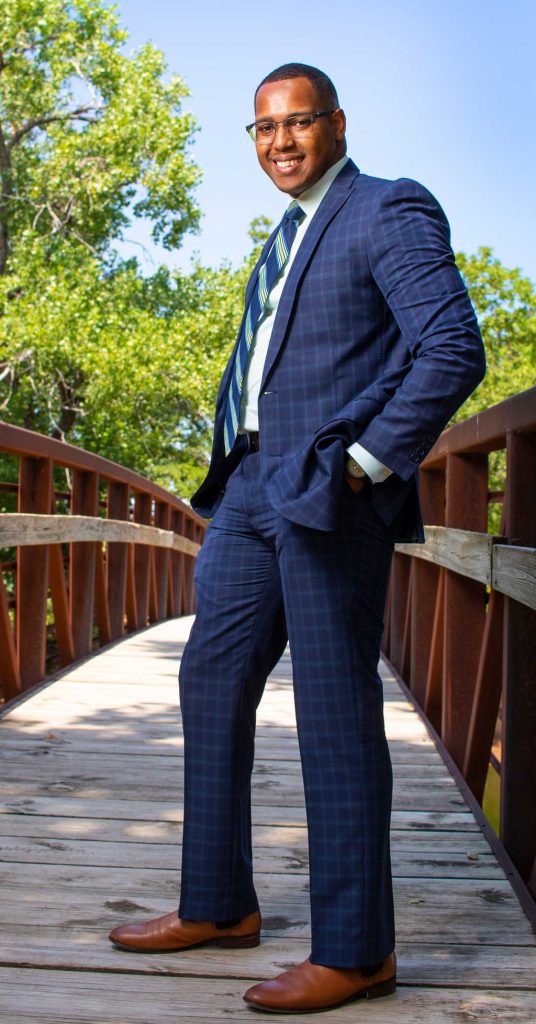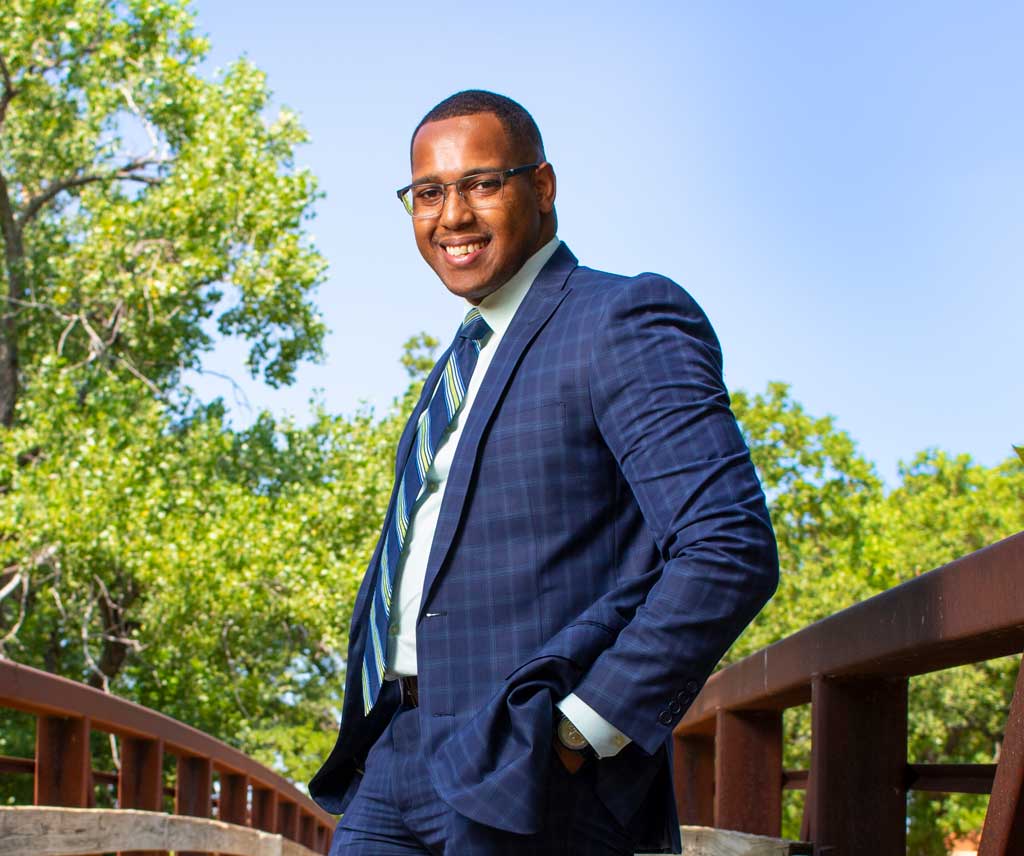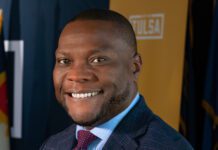Eran Harrill, an Oklahoma State University alumnus, is the CEO of the Oklahoma City Black Chamber of Commerce. He also has had a long career in the National Guard, along with experience in business marketing and public service. We caught up with Harrill and got his thoughts on …

… the many hats he wears.
Until earlier this year, I spent all of my nearly 10-year military career in Alpha Company of the 179th Battalion. I was part of the 2011-2012 deployment to Afghanistan and was stationed at COP Najil in Laghman Province.
In 2009, I started working with AT&T Advertising Solutions, which became YP Holdings, during my deployment to Afghanistan. In 2012, I was asked to help rebrand the chamber, which … had transitioned from the Capitol Chamber of Commerce to the Black Chamber of Commerce of Metropolitan Oklahoma City. I have been blessed in my civilian career to work with many great organizations and honored to serve the state and country in a variety of capacities.
… accomplishments at the chamber.
Earlier this year, Oklahoma was one of five states selected by the National Skills Coalition to advance state policies and programs. We are honored to work with the Oklahoma Office of Workforce Development, representing the state on a national level as we build work-based learning opportunities. Another major piece of work is diversifying our public safety workforce. Over the last couple of years, we started working with several law enforcement agencies [and] helping them have a thoughtful focus on hiring officers who are more representative of the communities they serve. Last year, this initiative led to the creation of the Minorities in Public Safety Scholarship program.
Earlier this year, after helping to secure $1.4 million in development funding, the OKC Black Chamber did a historical ground breaking at Northeast 23rd Street and Rhode Island Avenue. In July, we followed that up with a ribbon cutting on the first health clinic to be opened in northeast OKC in over a decade.
… young people as public servants.
Through the military and the chamber, I speak to many young people about the importance of selfless service. One of the biggest pieces of advice I give is that the basis of any type of service is just that – to serve. Too many times we see people rise through the ranks and watch them forget that being a public servant means that you truly have the thoughts and welfare of other people first in mind. I once had a young lady ask me, “How should I feel when older people tell me that I need to just sit down and wait my turn?” Having experience and a master’s degree, she was certainly qualified to have a voice on the topic, but her youth was working against her.
I told her to take that feeling of frustration, box it up and hold onto it for the next 20-plus years because one day there will be a young person in front of her who is full of great ideas and looking to her as a mentor.
Public service is much like this. The things you advocate for and the foundations you lay today will have a profound impact in someone’s life in the future. How positive that impact is remains up to you. To have a hand in changing people’s life for the better, there are few honors that are greater.
Read on for extended answers and web-exclusive questions with Eran Harrill.
… his priorities at the chamber.
First, economic development in northeast OKC. When you think about all the amazing development that has happened throughout other parts of the city [in the past decade], it’s almost mind-boggling. [But] while every other part of Oklahoma City has experienced growth by an average of 30 percent, northeast OKC has declined by 12 percent. The Black Chamber exists to advocate on behalf of a part of the city that too often has been forgotten as major development has happened around it and never in it.
Second, providing sustainable workforce opportunities to disadvantaged communities.This covers a massive scope of objectives, from job creation and opportunities to business support and entrepreneurship. In order to move a disadvantaged community from one of poverty to self-sustainability, you must provide the people who live in it not just opportunities, but opportunities that show a pathway to success.This is why representation is vitally important. If a young black male wants to become a pilot, but he never is exposed to opportunities to be around planes and he never sees a black pilot, then, in his mind, there is no pathway to becoming a pilot. The same applies for women in science, math, engineering or other male-dominated industries. The Black Chamber works to ensure that the business and employment opportunities are attainable to all who seek them.
Third, creating an environment where an inclusive culture thrives. Many times, I am asked if you must be a black-owned business or individual to be a partner of the OKC Black Chamber. Not only is this a resounding no – almost half our partners are non-minority – it could not be further from the culture within the organization. While part of our mission is to be a sounding board for minority communities that have historically been underrepresented, our overall mission is to be part of building a city in which every person, every community and every organization feels welcomed.
I once heard someone say there isn’t a diversity issue; there is an inclusion issue. Unfortunately, in many aspects, this is true. I am a big fan of Mayor [David] Holt and the work that he is doing to ensure that every citizen in this city feels like they belong, regardless of what part of the city that you are in. The opportunities are there for the diverse, 1.4 million people who call the Oklahoma City Metro home. This is something that the OKC Black Chamber strongly supports and embodies within our organization.
… his military duties.
I am not full time with the National Guard, although I do work my duties in a non-traditional way. I am the retention noncommissioned officer for the 179th Battalion. My responsibility is to assess and build on retention programs that will lead to higher retention rates for the battalion. It is a role that essentially merges what I do on the civilian side with the military side. Retention starts when a soldier completes basic training and advanced individual training, before they go to their assigned units stateside. It is about providing a complete good soldier experience and not simply waiting until a soldier is six months from a separation date to begin trying to retain them.
I spent much of last year deployed to Ukraine as part of a NATO mission to train Ukrainian forces the NATO and U.S. combat defensive military doctrine.
… his desire to work in public service.
It is undeniable that experiences you go through in life tend to shape your approach to other things as they happen. Your attitude will usually determine through which lenses you choose to view that experience and what lessons you take away. I knew when I was a young child that I wanted to be in the military. My uncle was in the Air Force and Navy when I was growing up and I was always mesmerized seeing men and women in uniform.
As I got older and read more books that showed the unity and sense of brotherhood in the military, specifically the infantry, it was just something that I was drawn to and knew I wanted to do. Since I became an adult, being in the military has taken on a different meaning. Now I understand that I am one of those soldiers who young kids look up to and may one day want to emulate. Even my own soldiers need proper, caring leadership to help shape and mold their careers and lives. It is a powerful responsibility.
One of my greatest fears has always been living without making a positive difference. That has driven me to try and change things for the better in whatever space I find myself in. One of the first things I did before considering throwing in my hat for the leadership position of the OKC Black Chamber was to ask myself if I truly had a vision that could help create an environment of positive change. I think that’s what you see in the programing and the work that we are doing.
… the importance of incorporating active military personnel back into the civilian work force.
Helping active duty military soldiers transition into the work force after separation is critical from both a community and business standpoint. Many soldiers struggle to understand how to effectively quantitate their military training and experience, then translate it into something that makes sense on a civilian resume. Many companies have their own issues doing the same thing … so what you have is former soldiers unemployed, underemployed or in an industry that doesn’t allow them to use the skills they have acquired.
I would caution that it’s not just soldiers who are finishing active duty who suffer from this, but many National Guard and reservist soldiers also struggle with finding employment and using their skills to help set them above other applicants. Many businesses, particularly small ones, do not understand the commitment required to be both a civilian and a soldier, so there’s an educational process that is personal to me. Since being in the military, I have always been sensitive to the need of more support for those in uniform, but deployments certainly have a way of reinforcing that.
… how his experience in producing the documentary Citizen Soldier affected his role at the chamber.
It has made me more relatable, more understanding, more determined in the face of seemingly insurmountable odds.
Making a film is like starting a small business. You have to establish an LLC, look for funding, explore distribution options, find a reliable support system and, probably most important, learn who to trust and who is just trying to profit off your hard work with the minimum amount of input. When I meet with small-business owners, entrepreneurs or established companies, I can appreciate the backstory and the drive it took to get to that point.


























